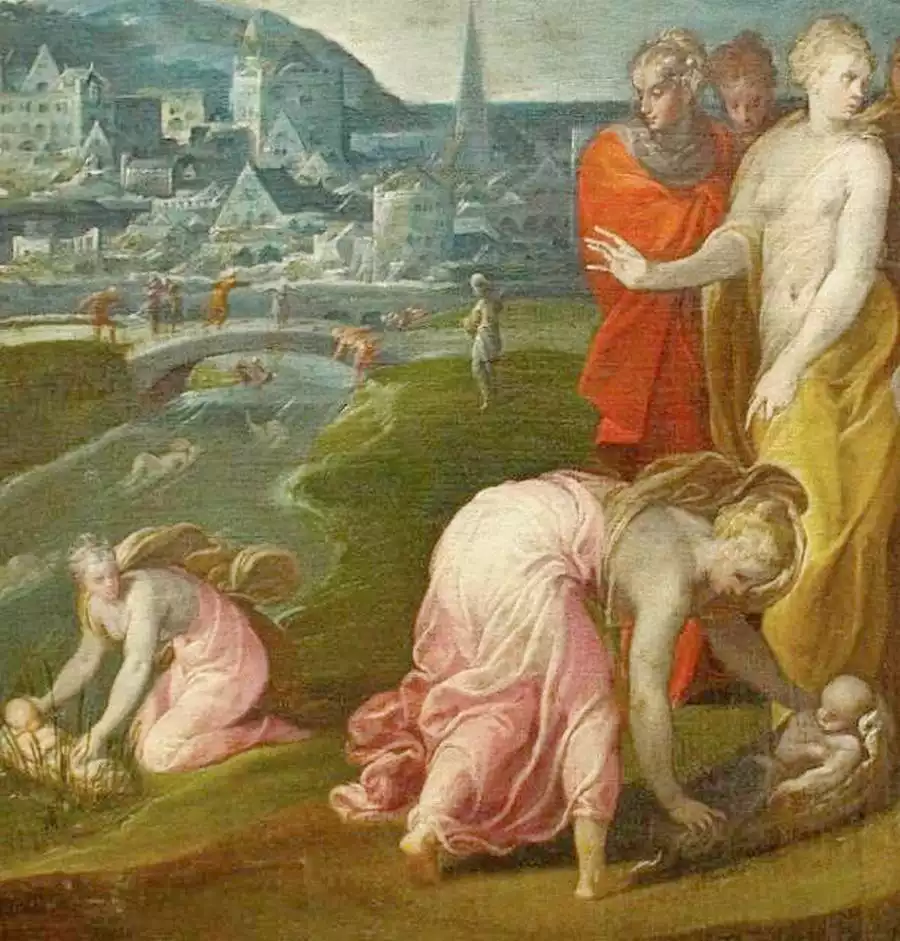
Moses was the towering historical figure who led the Israelites out of slavery in Egypt in perhaps the 13th century BCE. As a baby, the story goes, he was placed in a basket and set adrift on the Nile by his Hebrew family to save him from an Egyptian decree that all newborn Hebrew boys be killed. Ironically, he was rescued by an Egyptian princess and raised in Pharaoh’s household, only to emerge later as the great liberator of his people. Though initially reluctant to take on this monumental task, Moses would shepherd the Israelites through epic trials and finally to the Promised Land, etching his name forever in the chronicles of history.
Prince of Egypt to Freedom Fighter
Moses’ origins were humble yet his destiny was forged in the courts of kings. As an infant floating in a homemade ark on Egypt’s Nile River, the boy was discovered and adopted by the Pharaoh’s daughter. Though born a lowly Hebrew slave, he was now a prince of the mighty Egyptian empire. The unfolding biblical narrative reveals little about Moses’ upbringing or years as an Egyptian royal, though extrabiblical ancient sources recount that he led armies and became a respected leader. Ironically, the new prince’s own people remained in bitter bondage, toiling under the overseer’s lash and bountiful Egyptian taskmasters.
Yet Moses yearned to alleviate his people’s suffering. One fateful day he witnessed an Egyptian abusing a Hebrew and was thrust into action. Seeing no one was around, Moses swiftly killed the cruel Egyptian and buried his body, perhaps hoping the rash act would go unseen. The next day however, Moses spotted two Hebrews fighting and went to break it up. “Will you kill me too?” one barked, realizing Moses had killed the Egyptian. Word spread rapidly and Pharaoh heard of the matter, seeking to execute Moses. The prince suddenly became a desperate fugitive, his lofty position crumbling to dust.
Fleeing Egypt, Moses ended up in the land of Midian, dwelling with a priest named Jethro. He married Jethro’s daughter Zipporah and together they bore a son named Gershom. Moses settled into quiet life as a shepherd yet struggled to forget his captive Hebrew kin languishing back in Egypt. After many years, Moses was shepherding his flock near Horeb, the mountain of God, when an angel appeared in flames from a bush. Moses was stunned when the bush burned but was not consumed by the fire. As he approached for a closer look, God called his name from the flames: “Moses! Do not come any closer. Take off your sandals, for you are standing on holy ground.”
Let My People Go – Epic Confrontations with Pharaoh
The Lord unfurled His plan from the burning bush: Moses must return to Egypt and demand Pharaoh release the Hebrew slaves. Surely this stunned the former prince – confront the dictator who once sought his life? Yet God assured Moses He would be with him. The Almighty even gave him miraculous signs to sway Pharaoh, transforming his staff into a snake. Still, Moses felt incompetent for the task, lamenting he was “slow of speech.” Angered by his protests, God designated Moses’ brother Aaron as his spokesperson.
Thus Moses returned to mighty Egypt after years in obscurity. Joining Aaron, he assembled the Hebrew elders, performing the wonders as God directed. The elders were amazed yet Pharaoh remained stubborn despite the portents, refusing the request to release the slaves. In retaliation, God unleashed the first of 10 terrible plagues upon Egypt. The waters of the Nile turned to blood, fish perished and the river stank. Still Pharaoh’s heart hardened.
The plagues intensified with frogs, gnats and flies swarming Egypt. Next the livestock died and painful skin boils afflicted man and beast. Still Pharaoh resisted. With the plague of hail, even Egyptian officials begged Pharaoh to relent: “Do you not yet realize that Egypt is ruined?” Finally the locusts blanketed Egypt, devouring any crops the hail left intact. Still Pharaoh stubbornly refused. No gods conjured by Egyptian magicians could match the Hebrew God. As the implacable Pharaoh crossed his arms, darker days descended.
The final showdown commenced with ominous words from the Lord: “About midnight I will go throughout Egypt, and every firstborn son in Egypt will die.” A killing darkness flooded the land while Hebrews marked their doors so God would “pass over” their homes. That fateful night, cries of grief swept Egypt as death invaded every house without the sign. Not even Pharaoh’s palace was spared. Finally broken and fearful, Pharaoh expelled the Hebrews from Egypt though he soon rued that decision and dispatched his army in pursuit.
As Moses stood before the Red Sea with Pharaoh’s vengeful army closing in, it seemed all hope was lost for the fleeing Hebrews. But God miraculously parted the waters, allowing His people to pass unharmed. When the Egyptians gave chase, the waters collapsed upon them.
So passed the enslaved generation, led to freedom at last by Moses, shepherd prince turned deliverer. Yet ahead lay 40 arduous years wandering in the Wilderness, as a new generation was prepared to finally inherit the long-promised land.
References
Alter, R. (2004). The Five Books of Moses. W. W. Norton & Company.
Hoffmeier, J. K. (2005). Ancient Israel in Sinai. Oxford University Press.
Meyers, C. (2005). Exodus. Cambridge University Press.
Sarna, N. M. (1991). The JPS Torah Commentary: Exodus. Jewish Publication Society.
